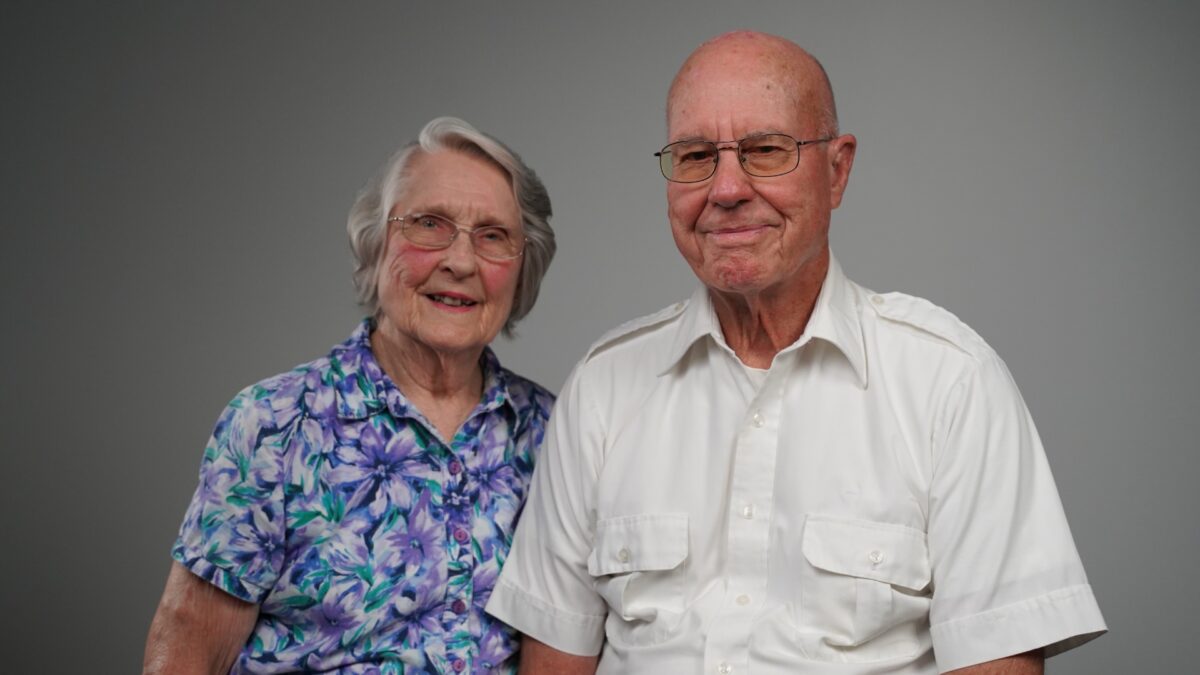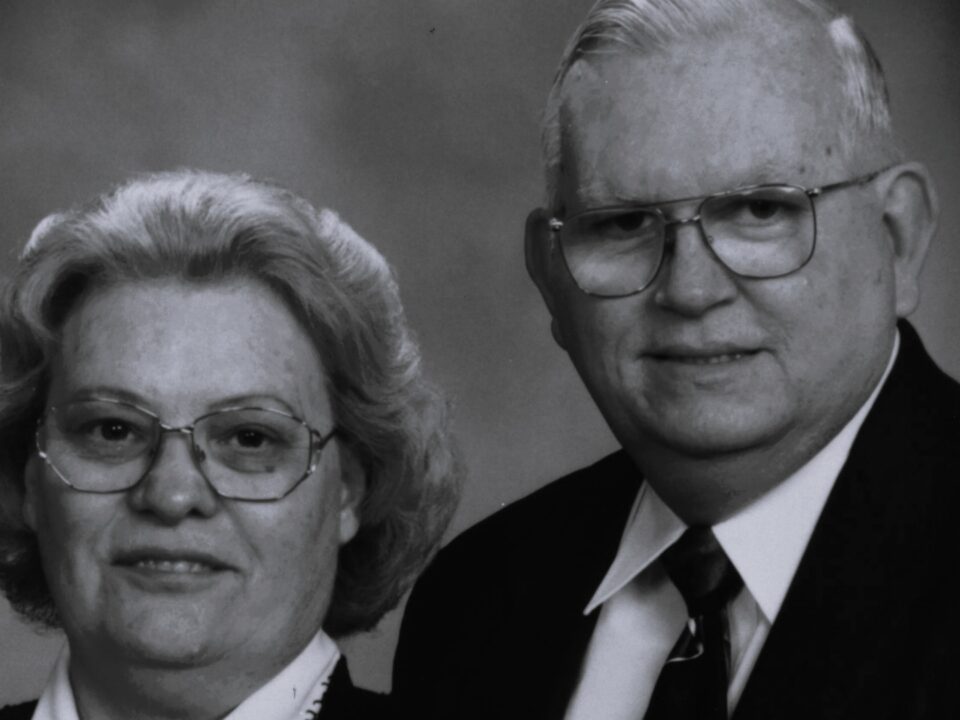Heroes of the Faith | Frank & Karon Auterson

Frank Auterson, born in Ponca City, OK, in November 1936, as the youngest of three boys, would become all too familiar with a life of uncertainty. At four years of age, he was sent alone by bus to live in New Mexico with his maternal grandparents whom he didn’t know. Only later would he come to the realization that his mom and dad had gone through a divorce during the time he was separated from them. A few years later when Frank had broken his arm and needed medical treatment, would his mother come pick him up and take him to San Francisco to live with her and his stepdad. When that marriage didn’t last, Frank, by then age 16, stood as the best man at the wedding of his mom and a third husband.
With this new stepdad being in the Air Force, Frank was introduced to the military while still in high school, and he joined the Naval Reserves and later the Army National Guard. After graduating high school, Frank joined active duty in the Air Force for four years where he learned to be an aircraft electrician.
By God’s grace, Frank was befriended by a family who had taken him in as a struggling teenager. A few years later, this same family was saved in a Billy Graham crusade and when Frank reunited with them, he learned how God had changed their lives. Frank frequently spent his weekends leaving the air base so he could spend more time with them. He too watched the crusades on television, and a few weeks later, while on base, he called out to God, “I don’t know how to find you, will you find me?”, and God was faithful to do exactly that. Soon Frank was able to make contact with a Billy Graham counselor (a brother-in-law to his friends) and he was led to the Lord for salvation at the age of 22.
When Frank completed his active duty in the Air Force and was working as a technician at Bell Telephone, he felt a distinct call from God one day to do something more with his life. He had worked two summers as a camp counselor and had told God that he would do whatever God wanted with his life. God’s calling became undeniably clear one day as he was sitting through job training and was impressed with the fact that he wasn’t where God wanted him to be, so he immediately went on a coffee break and knelt down and surrendered to do whatever God wanted him to do. In receiving counsel from pastors he knew, he came to the realization that he was being called into ministry and that Baptist Bible College in Springfield, MO was the best place for him to go.
Karon Patterson, born in Harper County, KS in September 1938, had five siblings. They grew up on a farm where they grew wheat and a few cattle. Her daily responsibility was to milk the cows before and after school. She learned how to drive a tractor before learning how to drive a car and she even rode a horse with her brother to school as a first grader.
Karon grew up in a home with very strong moral values, but the family didn’t attend church. She would only attend VBS or Sunday School occasionally with a friend. When Karon graduated as valedictorian of her high school class, there were no scholarships or loans available for her to attend college. Instead, she took classes such as shorthand and typing while in high school that would prepare her for a job. After graduation, she was approached by a local banker who offered her a job, and there she worked for three years.
Since the bank closed every day at 3:00 pm, she had her afternoons and evenings free to spend with her friends who were going to church events. It was there she came to realize her need for salvation and, at the age of 18, she called on the Lord to save her.
As she continued to attend church and many youth meetings, she saw several missionaries come through who would talk of the mission field. Soon God began dealing with her heart about being a missionary and, upon her surrender to missions, the decision was made to attend Baptist Bible College.
She worked at the BBFI Mission Office for 2.5 years while in college as an assistant to Mission Director, Fred Donnelson. Her job, which consisted of a few hours a week doing filing and dictation, turned into several days a week. She even tackled the task of typing up all the original prayer cards that can be seen in the Mission Office lobby today.
When Karon heard the pleas that Fred Donnelson relayed from Ethiopian Emperor Haile Selassie to come spread the Gospel, she knew God wanted her to go. Since, after graduation, she still wasn’t old enough to go as a single lady to the mission field, she chose to attend the Burge-Protestant School of Nursing (later known as Cox College) in Springfield, MO, knowing that nursing would be helpful on the field and that, upon graduation, she would then be old enough to move to Ethiopia.
Yet God had other plans as he brought Frank and Karon together in holy matrimony in May 1965 at Cherry Street Baptist Church. After Frank graduated from BBC and Karon from Burge, they served their internship at Temple Baptist Church, now known as Orlando Baptist Church in Orlando, FL, from 1965-1966. Traveling in a Volkswagen bug across the country on deputation, after they were approved for the field of Ethiopia in September 1966, they arrived on the field December 1967 and promptly began language school to learn Amharic.
The Autersons pioneered in the new field establishing Bible studies in the villages north of the capital of Addis Ababa and mission schools at Kobo and Robi which, by the year 2001, would have 800 students in grades 1-6.
Until her attention was required in establishing classes to teach the illiterate, as promised to the Ethiopian government, Karon used her nursing skills by opening a medical clinic all while teaching children’s Sunday School and ladies Bible classes. On three occasions, she was invited to the homes of Ethiopians to deliver babies, with the first one delivered under the stars.
When life in Ethiopia was becoming more and more volatile every day with reports of brutalities occurring from Communist takeovers, the Autersons knew, after investing 10 years in sharing the Gospel there, that when they left on furlough July 1976, they would be unable to get back in and, indeed, all missionaries were soon asked to leave the country.
A few months later, God put Frank and missionary Dan Peters together in a hotel room every night for a week during a round robin mission conference. As Dan shared about the needs and ministry in Papua New Guinea, Frank soon realized that God was calling him and Karon to join Dan and his wife, Patty, there in ministry. After approval for a change of field in July 1978, they arrived in PNG. In January 1979, they settled in Kokopo where they began their first church plant, often using Gospel films for outreach as they had in the past. With the church positioned between the Methodist church and Roman Catholic church in town, they set out to present The Way, The Truth and The Life through soul winning, Bible study groups, and evangelistic meetings. The Catholic priests hindered them at every turn, even threatening churchgoers that they would go to hell if they attended Frank’s Bible classes.
New Guinea, as the world’s largest tropical island, has over 800 tribal languages. Melanesian Pidgin, considered to be the trade language, was easily picked up through conversation. Frank, with the help of their young boys, Loyal and Lance, who picked up the language quickly, was effectively preaching in Pidgin after just three months. Those who were educated could speak some English from the country’s former ties to Australia and its current status as a Commonwealth Realm established in 1975.
Many cocoa and coconut plantation workers who came into town from the highland provinces heard the Gospel, were saved, and quickly began spreading the Good News to the many plantations that were scattered all over the island. Many opportunities opened to Frank to teach and preach including 700 young people at a vocational school. More churches sprung up with regular Bible studies and soul winning. God even used a “good” earthquake registering 7.1 magnitude to bring more people to church the following Sunday. Their ministry expanded into surrounding islands and highland provinces with many national pastors having gone on to establish more churches with the help of missionaries, Richard and Joyce Crotts.
Word came from one of their Christian leaders in Robi, Ethiopia that the church they had to leave behind during the Communist revolution had undergone great persecution. But where there had been 30 believers when they left, the church was now reaching over 300 in attendance. Nonetheless, with the fall of that regime, the church was again persecuted, not by the new government, but by the old Orthodox Coptic Church of Ethiopia.
In 1994, the Autersons were challenged to pray about returning to Ethiopia and, by the end of 1998, they had peace and God’s leading to do so, arriving back in Addis Ababa in January 2000. The “Jesus” film, which was available in many different languages, was shown to individuals and groups alike, even using a 12-volt car battery to power the portable DVD player. This was an effective evangelistic tool as more than 40% of Ethiopians were Muslim.
Through their continuing efforts, they were able to conduct their first outreach into the mountain villages where there was only satanic darkness. “Ethiopia can be a very discouraging place to minister the Gospel,” Frank would pen. Annually, many Ethiopians celebrate a religious custom called Adbar with roots dating back into ancient Babylon. A village wizard (also known as a priest or witch doctor) selected a place of spirit worship such as trees, rivers, springs, rocks, hilltops, or high places where offerings were left for the ancient spirits. After witnessing for two years to a man named Werku, whose father and grandfather were wizards, God’s grace impressed upon him to refuse to follow the dark path of his ancestors, but rather, tried to reform his life and the old family compound, planting new trees in the area. National pastor, Tura Mako, took him through the scriptures and he called on the Lord Jesus Christ to be his personal God and Saviour, breaking the chains of the past.
In 2006, Frank was part of a team that went to the Dimma Refugee camp along the border of Ethiopia and Sudan to teach and preach to the Nuer people who had been driven from their homeland in Sudan since 1992. They were able to baptize 153 believers in the river, and plans were laid to begin training some of the men in Biblical doctrine. As the team left the camp, new believers were heard saying “as soon as peace comes in our homeland, we will return and take the Gospel to our people. Only once in a lifetime could this happen.” Little did they know, this would begin to prepare the way for future ministry in the country of South Sudan which as yet had not been formed.
In July 2006, the Autersons moved from Addis Ababa to Fitche in Northern Ethiopia where Karon would serve as a volunteer English teacher for several years in the Abdi Boru Primary School. This provided them with work permits and a resident status to remain and work in Ethiopia. Karon began learning another language – Oromifa, in order to communicate better with her students in the school. New believers were organized into the North Way Bible Baptist Church and work was begun to acquire land from the government to build a church building.
After 20 years of being displaced from their country, the Nuers were repatriated back to southern Sudan in 2007. Frank and his fellow missionaries made plans to follow them in order to help establish Baptist churches in what would be a new territory for BBFI. Prayers began in earnest that God would open the door for BBFI to send Baptist missionaries to plant churches there.
In 2009, Frank and missionary, Rex Switzer, flew into Juba, southern Sudan, to meet with the Minister of Religious Affairs. They were successful in obtaining a registration and enabling them to be legally recognized by the government for church planting just 21 years after the Islamic government in the North killed 2.5 million, and driving four million refugees into Ethiopia, Kenya and Uganda in their attempt to Islamatize the Christians and pagans living in the south. Now, diametrically, the Sudan government proposed a referendum to vote for a separation of North and South Sudan in 2011 which would give South Sudan more religious freedom.
Driving for three days on very difficult roads, sleeping in tents and experiencing great inconveniences, including temperatures hovering over 120’F, Frank and his fellow missionaries reconvened their training sessions with the Nuer believers who had been repatriated. Multiple trips were made to the area where evangelism and training continued with the new believers and leaders, thus seeing more than 18 congregations established there from 2006-2016.
In June 2010, Frank and Rex Switzer were able to obtain work permits from the South Sudan government which would pave the way for mission stations to be established in the interior. Then in July 2011, South Sudan gained their independence. Much fighting would continue over the ensuing years as they fought over access to the oil reserves in the South.
In March 2012, their ministry in Ethiopia and South Sudan was dramatically hindered as Rex became ill while in South Sudan with three strains of malaria – one strain being fatal. Knowing how vulnerable they all were to the health risks of living and ministering in remote areas, the Autersons pressed on with God’s call on their life to get the Gospel to those who still needed to hear.
By December 2015, civil disturbances and demonstrations against the new governmental reforms began to be commonplace, often blocking highways. By spring 2016, the Ethiopian government would not renew their resident visas and Americans were advised by the US Embassy to avoid, and were later banned from, travel within the country.
But after persistent prayers, once again Baptist Bible Fellowship International, in November 2018, was registered by the Ethiopian government as a result of the hard work of missionary Eric Shadle and more work permits would soon be available.
However, the Autersons were experiencing several health issues while seeing to the needs of their elderly mothers during Covid restrictions, and a difficult decision was made to retire from the field in November 2022. They continue to be actively involved at Cherry Street Baptist Church where their lives as a couple began. Frank and Karon are extremely grateful to the churches who have partnered with them through the years in taking the Gospel to the regions beyond. Although they have always known uncertainty in their life and ministry, their faith in a sovereign God has never failed them.
-written by Jill Wolf



